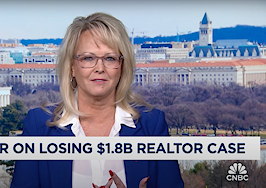This report is available exclusively to subscribers of Inman Intel, the data and research arm of Inman offering deep insights and market intelligence on the business of residential real estate and proptech. Subscribe today.
For three months, Intel’s flagship monthly survey has captured industry sentiment at pivotal points of the Sitzer | Burnett commission lawsuit.
First, in the closing days of the trial. Then, in the weeks after the jury sided against real estate trade groups and brokerages, during which industry professionals were processing the news. And most recently, in the early days of action for brokerage leaders and agents alike.
For Inman Director of Research Chris LeBarton, the survey is playing out exactly as intended. The Inman Intel Index — or Triple-I — has painted a clear picture of an industry in transition, asking detailed questions of the steps that leaders are taking along the way in response to Sitzer | Burnett and other commission lawsuits that threaten to upend the way real estate professionals make money.
LeBarton recently joined Intel reporter Daniel Houston to discuss the latest findings from this month’s Triple-I survey, which were gathered in late November.
SEE THE RESULTS OF NOVEMBER’S INMAN INTEL INDEX HERE
The conversation below has been edited for length and clarity.
Intel: It seems that this is a transitional moment in the Triple-I. The previous month, people were still processing — brokers and agents — what just happened in the Sitzer | Burnett case, and what’s still on the horizon in the other commission lawsuits. This month, it seems like they’ve had a little more time to process, and they are in reaction mode.
LeBarton: It’s getting to that point where we can really track the ebbs and flows of the sentiment. This [next] survey will be going out immediately after people are popping champagne, and thinking, “Rates are getting cut next year!”
So I’m curious to see how much we can tie these acute events to when the survey was sent, and then how much is just broader, “Yeah, people are really adjusting to this now, and scared.” Some of the responses that I’m pulling right now, “scared” just keeps coming up.
Yeah. I think there have been some people over the years who have said, ‘No, this is going to improve the relationships with clients and their agents, because there will be potentially a better setup for commissions.’ But most brokers who replied to the survey — 62% — said they expected it to negatively affect client perceptions of commissions, and only 9% said they expected it to bring about positive change.
Yeah, and not that I thought the 9 percent was high. I guess there’s always going to be a group that — it’s not just unfounded optimism. People could see the logic behind, “Oh, this will drive transparency; this will give us the opportunity to connect in a different way with our clients.”
I’ve talked with you a number of times about how [working in the lending industry] I experienced the fallout of the [global financial crisis]: the massive change, regulatory and disclosures. You had to painfully spell out how you are getting paid. And it was always there, but now it was painful and drawn out. And you had to walk through, and in some ways, absolutely, it helped clients. In other ways, it was like: “Wow, really?”
And the standard [lending officer] commission at that time was somewhere between 1.5 percent and 2 percent. It was a transition for sure.
One of the questions you asked these brokers and other brokerage leaders was what was the biggest change they were making and the biggest steps they were taking in response to these lawsuits. What is the big focus right now among brokerage leaders?
To the degree to which dust has settled, at least on Sitzer | Burnett, we at least have some clarity that this did not go the industry’s way. And so, what’s next? That is what everyone was thinking about.
And what we’re seeing in the wake of Sitzer | Burnett, including that day on the verdict? More lawsuits. So this isn’t stopping. But with one at least in the books before any type of appeal, now there’s a sense of, “OK, this is happening. We’ve been dancing around it. We’ve been postponing it. We’ve been waiting for closure. Now it’s time to start getting our ducks in a row.”
And it seems as though, based on this survey’s results, action has largely replaced inaction.
And I think that action — from their point of view, they’re really focused on conversations with their agents and getting them up to speed on potentially how to interact with clients and what to expect down the way.
Yeah, and there’s an element we’ve seen in the last couple of Triple-I’s that I’m personally curious to see if it impacts this training or how different brokerages handle it.
If you looked back, there was still a disconnect between what leaders thought of the people in their companies, and how closely they were monitoring [the case]. Whereas, on the flip side, agents, Realtors, they were not only monitoring it, but they were confident that their leaders were, too.
I’m not sure how much, if at all, that plays out, but that disconnect was real. We saw it really clearly month over month. And I think to some degree, it might impact how that first wave of training goes.
For instance, if they thought that their agents were barely watching this, or not at all, they might think, “OK, we really need to do much more just flat-out education on the history, the case law, etc.” And that might cost time in some other pieces of the training, which are, “Here’s how we’re going to handle negotiations. Here’s how we’re going to handle buyer agreements.”
That’s more my curiosity, but that disconnect was real, and I’m very interested to hear from people in the game how the training is different, brokerage to brokerage. But yes, more than anything, it seems now is the time, as they were already doing it in some ways in a slower market, going back to basics, emphasizing what matters, getting your pitch down, understanding best business development practices. It’s just probably going to be operationalized in whatever the training programs are.
And that training is going to change over time because these lawsuits aren’t ending. We are looking at potentially years of this playing out. So what is being taught and told to an agent today is probably a leader’s best guess and the safest thing to operate on, but that training and the messaging will evolve throughout 2024.
I’m wondering too if there is this increased sense of urgency to have these conversations within the brokerage in part because we also see from the Triple-I that clients are now actually engaging with this, asking about this to their agents — buyers and sellers.
In one of our last conversations, I had speculated that it’s not in the water yet, but it’ll get there. And as more and more of these lawsuits start to hit, it’s only going to get louder.
I had two conversations this week. And it’s just two anecdotes. But one was with someone I had never talked about real estate with. But I mentioned something I was working on, [and they said,] “I’ve heard of those lawsuits.”
Then I talked with my own Realtor. She’s fantastic. And I asked her, “Are you hearing this yet from your clients?” And she said, “It’s not nearly every one of them, but it’s happening more and more.”
And so I think, going back to the question about the training, it has to be an evolving process. And if there was any disconnect — if our survey findings were correct on that disconnect between what leaders thought their [agents] either knew or were following here — there might also be a disconnect in what they think is being talked about with their clients.
So I feel it’s incumbent upon agents to make this a two-way street and constantly be training leadership, and saying, ‘This is what we’re hearing. This is happening. We need to be on top of this, we need to have better strategies, we need to rethink the buyer agency.”
Whatever it is, the agent needs to be very vocal and make sure that whatever it is, they’re getting from their leaders what they need.













